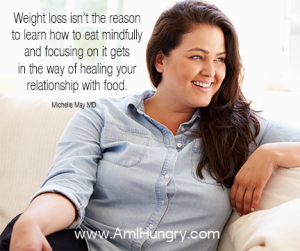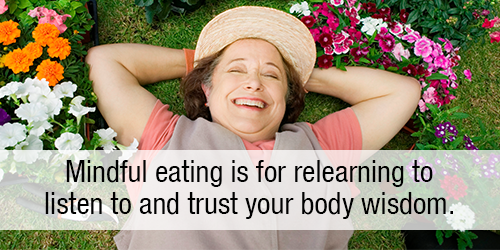In our weight-focused culture, the topic of mindful eating and weight loss comes up frequently. Although it’s a sticky topic to write about, I feel strongly that learning to eat mindfully for the purpose of weight loss is problematic and counter-productive.
Frankly, I don’t think that is something many health professionals or their clients want to hear. They have been conditioned to think in terms of, “How much weight can I lose with mindful eating?”

However, after working in this area for more than twenty years, I’ve seen that a weight loss motivation for mindful eating is counter-productive and interferes with the process of learning to listen to and trust ourselves.
Let’s explore some of the questions and comments I commonly hear related to mindful eating and weight loss and a little food-for-thought for your consideration:
Will mindful eating help me reach my “natural” weight?
Contrary to popular belief, body weight is not simply a matter of energy balance and discipline. Your weight is determined by a complex set of genetic, physiological, biological, environmental, and other variables—some of which have nothing to do with what or how much you eat or how much you exercise.(1)
Despite the constant drumbeat from diet culture, studies have shown that very few people lose weight and keep it off long term.(2) Although it might be attractive for wellness professionals to promote mindful eating as a “natural” way to lose weight, the focus is still on weight! That distracts you from healing your relationship with food—which is always the number one priority.
Resolving a love-hate relationship with food leads to sustainable and life-enhancing changes that simply can’t be measured on a scale.
How can mindful eating help me then?
Focusing on weight loss keeps you focused on the past and the future, neither of which you have any control over. Mindfulness is about awareness of the present moment, which is, after all, the only moment you’re in charge of!
With curiosity and awareness of your physical sensations, thoughts, and feelings, you learn to make decisions moment-by-moment that support the way you want to feel today. Through this process, mindful eating helps free you from consuming cycles of yo-yo dieting, weight cycling, and body-loathing, so you can invest fully in your life now.
And, as you learn to eat with intention and attention, you’ll develop skills and tools you can apply to other areas of your life as well.
Since mindful eating isn’t based on food rules, isn’t it better than dieting to lose weight?
There are many advantages and lasting benefits to eating mindfully, whether or not it leads to a change in your weight.(3) The same cannot be said for dieting.
In fact, turning mindful eating into a diet to lose weight is likely to lead to the same predictable results as any other diet. When, not if, you are imperfect, you’ll feel guilty and feed the eat-repent-repeat cycle. This ultimately makes it more difficult for you to make effective decisions about eating, physical activity, and self-care.
Instead, when your intention is to learn how to eat what you love and love what you eat, you can let your weight take care of itself.
But I’ve seen a lot of articles promoting mindful eating as the next big thing in weight loss.
To a certain extent, we’ll have to blame the media for this one! I’ve been interviewed about mindful eating countless times and even though I explicitly say that it is not about weight, some of the articles still show up with headlines like “How to lose weight with mindful eating.” This incessant focus on weight may lead to magazine sales and click-throughs, but it isn’t helping people develop a balanced, mindful approach to managing their eating and their lives.
But what about health? My doctor says I have to lose weight.
There is significant evidence that weight and health are not as closely linked as most people—including most health professionals—believe. Some larger-bodied people are physiologically healthy, while some thin people are not. A person’s weight is only one small piece of information and it is a huge mistake to make assumptions based on weight alone. (4)
Further, the most common outcome of any weight loss effort is not sustained changes in weight or health, but weight cycling which has been associated with poorer health outcomes.(5) Focusing on weight can also contribute to disordered eating, eating disorders, and weight stigma, all of which are detrimental to well-being.(6)
Overall, focusing on weight as the primary measure of health does more harm than good. (We have written extensively about the evidence in support of shifting the focus from weight to well-being. I won’t attempt to review that again here but if you’re not familiar with this research, please check out these resources.)
If I stop trying to lose weight, aren’t I just giving up?
That depends on what you mean by “giving up.” Giving up on an all-consuming and ineffective approach to improving your health? Yes!
Giving up on the pursuit of well-being and quality of life? Definitely not.
There is no evidence whatsoever that the majority of people who diet and lose weight will keep it off (2), and many people who chronically focus on weight loss end up emotionally depleted and less physically healthy than before they started.
On the other hand, there is a growing body of evidence that mindful eating can help you break the eat-repent-repeat cycle, improve dietary balance, rediscover joy in non-punitive physical activity, increase self-acceptance, improve self-management of various chronic diseases, and more. All of these changes will make you healthier at any size.(3)
So no, you are not giving up! You are saying yes to learning how to listen to and trust your body’s signals, giving yourself permission to eat what you love without guilt, and treating yourself with the compassion and respect you deserve.
But it is so hard living in a larger body in a culture that rewards thinness and stigmatizes fatness!
Yes, it is. But that is a social justice issue. Trying to lose weight to stop weight bias shifts the focus to you, instead of addressing the social injustice of weight stigma and the real harm caused by weight stigma in healthcare.(7)
The continuous cultural focus on weight as the problem fuels weight stigma. This stigma often becomes internalized, fueling the belief that you must lose weight to be valued as a person. That is simply wrong.
You are worthy and valuable as you are right now and you deserve to live free of bias and prejudice no matter what you weigh.
I have been trying to lose weight for so long that I guess I hoped that mindful eating would be the answer.
That’s understandable, given the culture we live in. It may be helpful to reframe the problem instead of focusing on a single solution.
Don’t underestimate the stress of hating your body and constantly wishing it was different. For many people, their weight isn’t creating the suffering; it is their painful thoughts about their weight and the futile pursuit of weight loss that causes them to suffer.
Gradually learning to embrace the fact that health and beauty come in all shapes and sizes can free you from the endless pursuit of weight loss that distracts you from living the life you crave.
Think for a moment… what does the life you crave look like? Peaceful, active, balanced, joyful… whatever you imagine that weight loss will do for you is available to you in the present moment.
Mindfulness helps you learn to live fully in the body you have right now, so indeed, mindful eating may be the answer you’ve been seeking!
What is wrong with wanting to lose weight?
There is nothing wrong with wanting to lose weight in a culture that reward thinness and punishes fatness.
However, is it possible that focusing on weight loss as the most important outcome is putting you in conflict with your body? Could it be distracting you from making sustainable changes in other valuable ways?
Since it is not possible to lose weight in this very moment, how many moments of your life will you waste feeling that your body is unacceptable? Mindfulness cultivates nonjudgment and self-acceptance, and self-acceptance breeds self-care.
But I want to feel good.
Of course you do, and that is possible right now!
What choices can you make in the present moment to feel good NOW? Eating foods you enjoy? Eating mindfully so you enjoy those foods more? Choosing foods that leave you feeling good instead of sluggish? Eating an amount of food that leaves you feeling content instead of miserable? Sleeping enough? Moving your body more? Choosing self-care activities?
All of these decisions, whether or not they lead to weight loss, help you feel good now rather than waiting around for something that may or may not happen in the future.
I’m a health professional who believes in a weight-neutral approach, but if I don’t market my services as mindful eating for weight loss, how will people find me?
I get it! In the past, we sometimes referred to our work as “non-diet weight management.” I even rationalized that it didn’t really matter what motivated people to learn about mindful eating, as long as they did. However, this “bait and switch” perpetuates the focus on weight as the primary outcome and leads to confusion and incongruence.
Further, even when your clients are experiencing the benefits of eating mindfully, they may fear that they are doing something wrong or that it isn’t “working” if they aren’t seeing the weight loss you lead them to expect. (Even when you don’t promise weight loss, people will still hope for it!)
As a weight-neutral company, we know how difficult it is to reach people who haven’t yet realized that focusing on weight only backfires, but we are committed to being part of the solution, not part of the problem.
So the bottom line is that mindful eating isn’t for weight loss?
That’s right. Weight loss isn’t the reason to learn how to eat mindfully—and focusing on it can get in the way of healing your relationship with food and living the big life you crave.
However, mindful eating is for relearning to listen to and trust your body wisdom so you create the space to live the vibrant life you though weight loss would bring you.
References
- Tylka, T., et al. (2014.) The weight-inclusive versus weight-normative approach to health: Evaluating the evidence for prioritizing well-being over weight loss. Journal of Obesity.
- Mann, T. et al. (2007). Medicare’s search for effective obesity treatments: Diets are not the answer. American Psychologist, 62, 220-233.
- Clifford D., et. al. (2015). Impact of non-diet approaches on attitudes, behaviors, and health outcomes: A systematic review. Journal of Nutrition Education and Behavior, 47, 143-155.e1.
- Tomiyama, A. J., et al. (2016). Misclassification of cardiometabolic health when using body mass index categories in NHANES 2005–2012. International Journal of Obesity, 40(5), 883-886.
- Madigan, C., et al. (2018). Is weight cycling associated with adverse health outcomes? A cohort study. Preventive Medicine, 108, 47-52.
- Bacon, L., & Aphramor, L. (2011). Weight Science: Evaluating the Evidence for a Paradigm Shift. Nutrition Journal, 10(1).
- Phelan, S., et al. (2015), Obesity stigma and patient care. Obes Rev, 16: 319-326.
This article has been updated from a previously published version.
Enjoyed this article? Here are three more to help you:
Diet culture: An outdated paradigm whose time is up!
A Non-Diet, Weight-Neutral, Mindfulness-Based Approach to Optimal Well-Being
Why a New Year’s Resolution to Lose Weight Doesn’t Work


